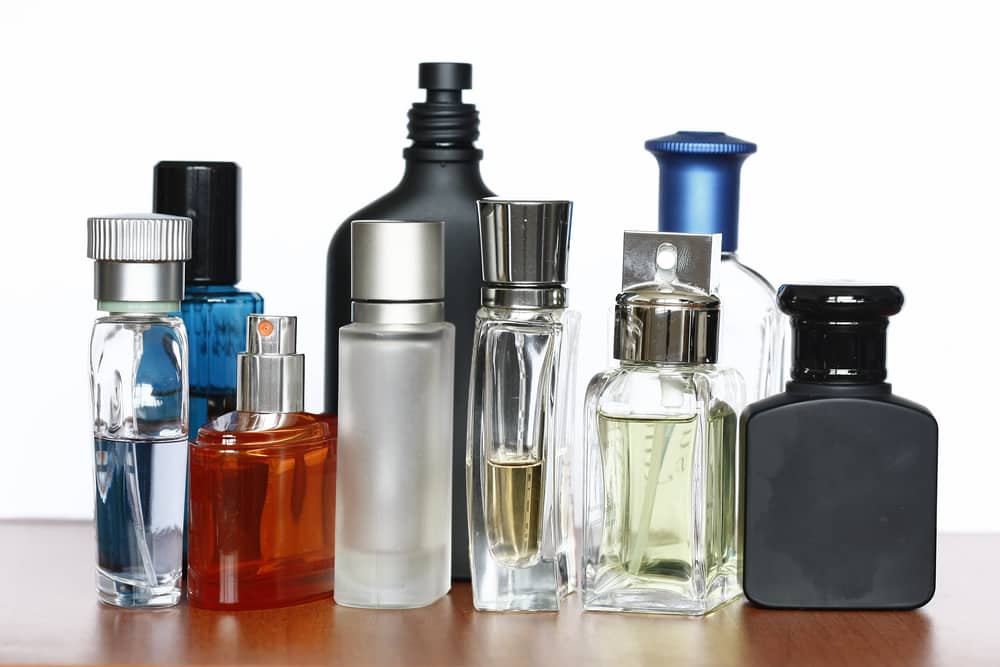Eau de Toilette, Parfum, Cologne … lots of different terms to describe perfumes with different characteristics – but what do they all mean? We’ll give you the quick guide to perfume strengths from Parfum to Eau Fraiche … read on!
What Does A Perfume Strength Refer To?
Perfume strength simply refers to the concentration of fragrant oils, relative to the alcohol or water content in the mixture. So very simply, a 50% concentration is 50% fragrant oils (those ingredients that actually create the unique scent of the perfume) and the remaining 50% is alcohol or some portion of water to act as a base.
Unsurprisingly, stronger perfume concentrations are both more powerful and noticeable, and likely to last longer on the skin. As they contain more of the (sometimes rare, often expensive) ingredients, its also unsurprising that higher concentrations lead to higher prices.
Perfume Strengths
Fragrance strengths are usually listed on the bottle, but it’s good to have a grounding in the different ranges to expect. Let’s go though the different terms, from strongest to lightest.

Parfum – The Strongest Concentration
Parfum (perfume) is the strongest concentration you’ll find. Technically, concentrations can range from around 20-50%, though you will usually find fragrances at the lower end of that range.
Why? Partly because most people don’t want their signature scent to be overpowering, but mostly it’s because of the cost of the ingredients!
Parfum can be a good choice for people with sensitive skin. This might seem like a paradox, surely the higher concentration would irritate the skin more, not less?
The reason of course, is the other side of the equation. More fragrant oils = less alcohol. It’s the alcohol that people often find irritates the skin.
Longevity: You’ll find that Parfum lasts the longest on the skin (not really a surprise – more concentrated oils will take longer to evaporate). Expect something in the six to eight hour range.
Eau de Parfum
Eau de Parfum typically will have concentrations ranging from 15-20%. So it shouldn’t be a surprise that:
- It’s a little less expensive than the high-concentration Parfum
- It’s still acceptable for people with sensitive skin as the alcohol content is still quite low
- The longevity is good, but not as long-lasting as Parfu. Expect something more in the range of four to six hours
Eau de Parfum is a great “middle ground” for those looking for a longer-lasting scent, without going top dollar for Parfum

Eau de Toilette
Continuing down the range now, Eau de Toilette typically has a lower concentration of 5-15%.
To be clear – by “down the range” we only mean the strength. It’s not a question of quality – although there are a lot of mass-produced scents in this range because of the affordable price point. Many very high-quality scents are available in a range of concentrations.
Eau do Toilettte gets its name from a French word meaning “to get ready” – but we’re sure its literal translation of “toilet water” has caused some confusion to English speakers!
You’re probably looking at two to four hours longevity with Eau de Toilette.
Eau de Cologne
Ah, now this is an interesting one. In many countries, the term “Cologne” has been co-opted to mean “a men’s scent“. It wasn’t always the case, it historically was more about the concentration and the ingredients, but the giant marketing machine is probably unstoppable at this point.
Colognes are typically around 2-5% concentration, and unsurprisingly the longevity is lower too – more in the range of a couple of hours.
Oobviously we’re generalizing hugely here. The actual longevity of all perfumes varies with temperature, humidity, and body chemistry.
And of course, some ingredients last longer than others.
Eau Fraiche
I’ll be honest. When I first started getting involved in the scent scene, I hadn’t heard of Eau Fraiche at all. It’s the lightest concentration, at around 1-3%, and accordingly lasts only an hour or two.
It has its place on the roster though – and not just because it has a lower price point.
A short spritz of Eau Fraiche is a more “casual” experience. It’s not going to linger, but it’s a short burst of fun- perfect on a summer day.
There’s another twist here too.
Eau Fraiche tends to have a higher concentration of water instead of alcohol. So even people with sensitive skin can dabble with this light, fun, concentration!
Before You Go…
Hopefully you enjoyed this run down of the different terms for perfume strengths!
Remember, its true that the higher concentrations are more expensive, but that doesn’t mean “higher concentrations = better quality”. Lots of great scents are available in a range of concentrations. But how do you find your “signature scent”?
That’s the focus of out next article!
How To Find Your Signature Scent
Related Articles
Bonus Video!
All product names, logos, brands, and trademarks are the property of their respective owners
